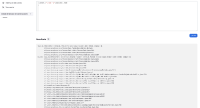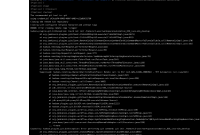-
Type:
Bug
-
Resolution: Unresolved
-
Priority:
Major
-
Component/s: core
-
Environment:Jenkins 2.426.3
I am experiencing an issue with all Jenkins agents after a random period of runtime (it can be an hour or even a day). The error occurs with any script that triggers the pipeline. In a more direct test, I attempted to access the script console of the specific node and executed println "uname -a".execute().text. This resulted in the following error:
java.io.IOException: error=0, Failed to exec spawn helper: pid: 15842, signal: 11
at java.base/java.lang.ProcessImpl.forkAndExec(Native Method)
at java.base/java.lang.ProcessImpl.<init>(ProcessImpl.java:314)
at java.base/java.lang.ProcessImpl.start(ProcessImpl.java:244)
at java.base/java.lang.ProcessBuilder.start(ProcessBuilder.java:1110)
Caused: java.io.IOException: Cannot run program "uname": error=0, Failed to exec spawn helper: pid: 15842, signal: 11
at java.base/java.lang.ProcessBuilder.start(ProcessBuilder.java:1143)
at java.base/java.lang.ProcessBuilder.start(ProcessBuilder.java:1073)
at java.base/java.lang.Runtime.exec(Runtime.java:594)
at java.base/java.lang.Runtime.exec(Runtime.java:418)
at java.base/java.lang.Runtime.exec(Runtime.java:315)
at org.codehaus.groovy.runtime.ProcessGroovyMethods.execute(ProcessGroovyMethods.java:544)
at org.codehaus.groovy.runtime.dgm$895.invoke(Unknown Source)
at org.codehaus.groovy.runtime.callsite.PojoMetaMethodSite$PojoMetaMethodSiteNoUnwrapNoCoerce.invoke(PojoMetaMethodSite.java:274)
at org.codehaus.groovy.runtime.callsite.PojoMetaMethodSite.call(PojoMetaMethodSite.java:56)
at org.codehaus.groovy.runtime.callsite.CallSiteArray.defaultCall(CallSiteArray.java:47)
at org.codehaus.groovy.runtime.callsite.AbstractCallSite.call(AbstractCallSite.java:116)
at org.codehaus.groovy.runtime.callsite.AbstractCallSite.call(AbstractCallSite.java:120)
at Script1.run(Script1.groovy:1)
at groovy.lang.GroovyShell.evaluate(GroovyShell.java:574)
at groovy.lang.GroovyShell.evaluate(GroovyShell.java:612)
at groovy.lang.GroovyShell.evaluate(GroovyShell.java:583)
at hudson.util.RemotingDiagnostics$Script.call(RemotingDiagnostics.java:149)
at hudson.util.RemotingDiagnostics$Script.call(RemotingDiagnostics.java:118)
at hudson.remoting.UserRequest.perform(UserRequest.java:211)
at hudson.remoting.UserRequest.perform(UserRequest.java:54)
at hudson.remoting.Request$2.run(Request.java:377)
at hudson.remoting.InterceptingExecutorService.lambda$wrap$0(InterceptingExecutorService.java:78)
at java.base/java.util.concurrent.FutureTask.run(FutureTask.java:264)
at java.base/java.util.concurrent.ThreadPoolExecutor.runWorker(ThreadPoolExecutor.java:1136)
at java.base/java.util.concurrent.ThreadPoolExecutor$Worker.run(ThreadPoolExecutor.java:635)
at java.base/java.lang.Thread.run(Thread.java:840)
It is not directly related to the uname -a script, as the issue occurs with any script execution attempt.
I am encountering an issue automatically at the start of the job if the node is broken.
The strange thing is that if I restart Jenkins, everything works fine, with the nodes already created.

